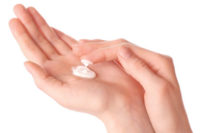Stick it to skin disease: Tips for protection against hazards

Since gloves are designed to help to protect the skin against corrosive substances, the occlusive conditions may lead to skin maceration and may also disturb the natural barrier function of the skin. Glove usage may lead to a loss of dexterity as well. Latex proteins or other raw materials from the glove rubber may cause allergies.
Also frequent hand washing and intense contact with water is a significant risk factor to develop a skin disease. The term wet work is used when the skin (mainly the hands) is exposed to moisture and wet conditions often and for a long time each working day (> 2 hours). Published research data indicates that wet work is the causative factor for many occupational skin diseases.
All these low-grade hazards do not lead to an instant acute skin irritation, but regular skin contact with them in non-acute toxic concentrations may lead to an irritant contact dermatitis (ICD).
Steps to stop skin disease
Dry and chapped skin is the first indication of a looming skin disease. Skin diseases can easily be averted at this early stage by skin protection measures and by paying more attention to skin care. Sustained pressures on the skin’s own regenerative capabilities, however, may result in development of a serious skin disease — and not exclusively in the case of allergy-related diseases — which may even result in the person affected having to give up his or her job.
To reduce development of skin diseases follow the TOP principle:
T – Technical measures to be used. These include measures to replace hazardous workplace substances, including technical measures to avoid skin contact to skin irritants.
O - Organize work practices to reduce exposure to hazardous substances to the skin.
P – Personal protective equipment (PPE) to protect the skin (mainly hands) from skin irritation.
When protecting hands against irritant workplace substances, consider more than just gloves. Gloves are indispensable when working with mechanical or severe chemical hazards but may create unintended consequences when used near rotating machinery. And when worn excessively, gloves can cause skin maceration, known to be a causative factor for occupational skin diseases. An occupational skin care program is an effective part of personal protective measures to keep the skin in healthy condition.
Skin protection products
Occupational skin protective products are never intended to replace primary PPE. They support the skin’s natural barrier against workplace substances or environmental effects on the skin at the workplace. Investigations demonstrate that a reliable protection against percutaneous absorption of systemically toxic substances is not to be expected. Therefore the term ‘invisible glove’ is incorrect relating to pre-work products and gives users a false sense of safety. Complete protection against any workplace substances cannot be provided by any general protective product.
Match pre-work (skin protection) products, skin cleansing and skin care products to the particular skin hazards involved. In addition to subjective assessment criteria, such as a pleasant odor and rapid absorption into the skin, consider certain aspects of product quality. Has the protective action of pre-work products been demonstrated using appropriate methods? Frequently, proof of efficacy cannot be produced for generic preparations, or when scientifically questionable methods are used as evidence. So-called “universal skin protectants” offer even less protection than special formulations. The manufacturer’s customer service and technical department can help when it comes to selecting suitable skin protectants for a particular situation.
Make sure products contain no substances that could irritate the skin or trigger an allergy.
Tips for protecting skin against workplace hazards:
- put on skin protection well before starting work
- make sure skin is clean before applying a skin protectant
- apply the protectant evenly and all over – areas between fingers, the nail beds and the area around the wrists are more often than not inadequately protected
- don’t forget to re-apply the pre-work product after washing your hands
- choose suitable products for your situation
- never wear gloves longer than necessary
- use a specialized pre-work cream under your gloves.
Select skin cleanser according to the nature and degree of the soiling because skin that is not cleaned in the proper way can trigger occupational skin diseases or create conditions favorable for them. To ensure mild and gentle skin cleansing:
- don’t use any industrial solvents or industrial cleaning agents to clean your skin
- choose cleansers suitable for the type of soiling
- avoid using a brush to clean your skin, if possible
- cleaning your skin with tepid water is best; the higher the water temperature, the more the skin suffers
- make sure ingredients are kind to the skin: ideally use solvent-free hand cleansers; do not use washing pastes containing sand, wood or plastic grits or powders
- don’t use more cleanser than necessary
- use the cleanser from sealed refills mounted in dispensers; tins and pails are unhygienic and have to be preserved with powerful substances that can trigger allergies
- carefully rinse off all skin cleanser
- dry hands thoroughly after cleaning them.
Tips on caring for your skin:
- regularly use skin care conditioners before longer breaks, at the end of the working day and at home
- choose skin care products according to your skin’s needs; very dry skin needs more powerful care creams.
Looking for a reprint of this article?
From high-res PDFs to custom plaques, order your copy today!





